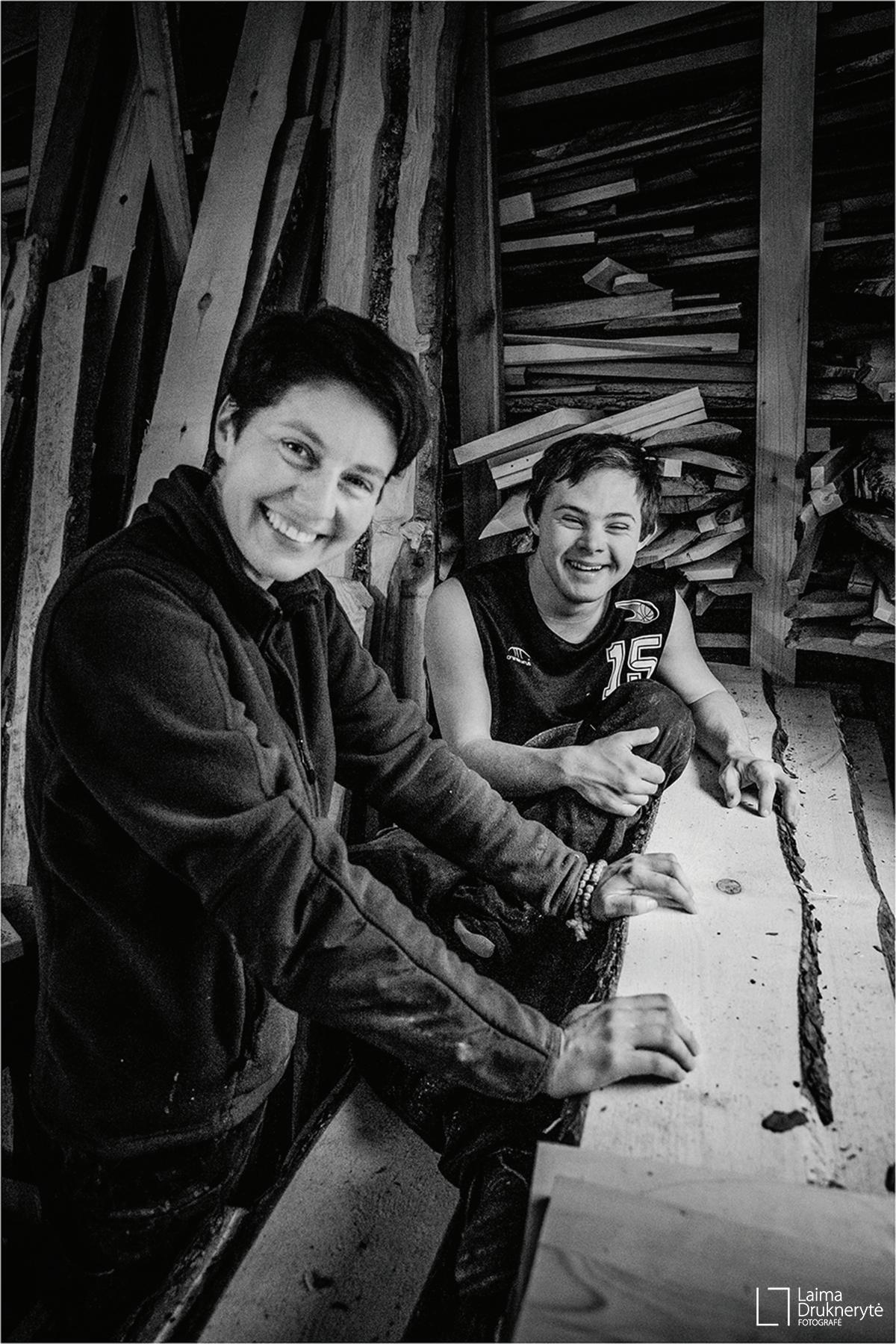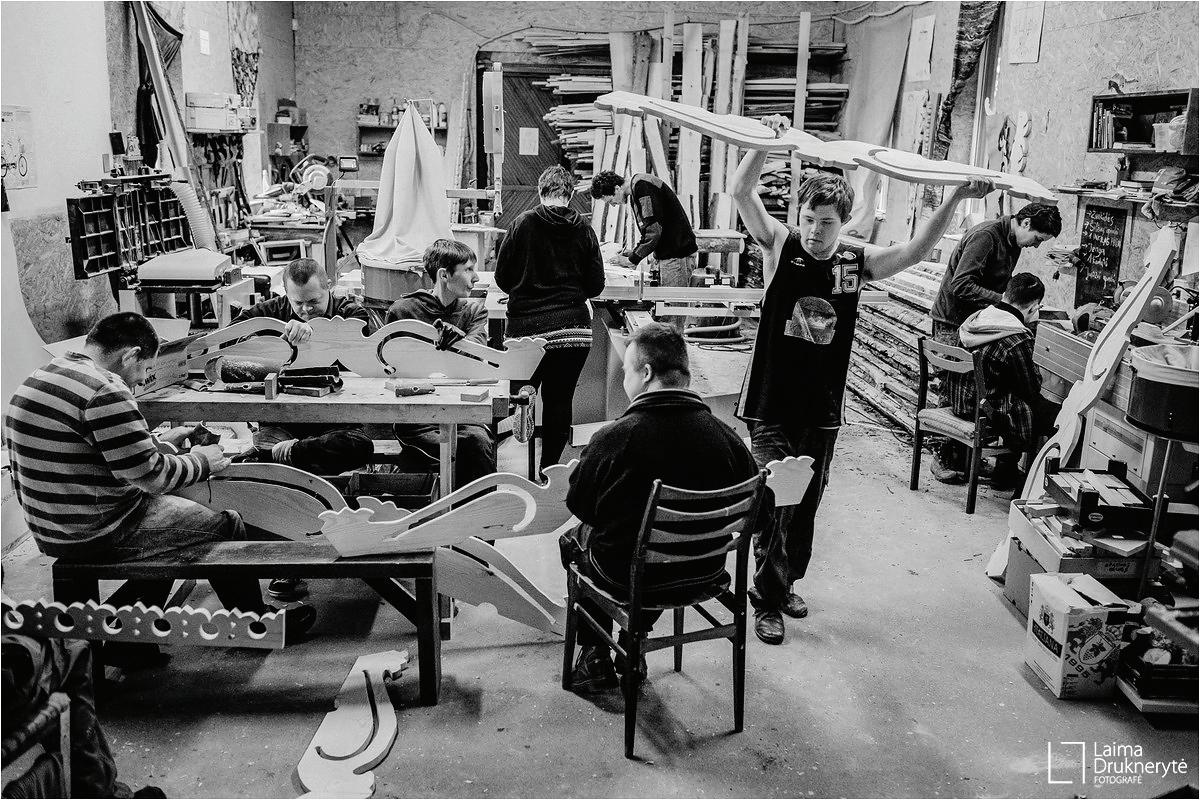
7 minute read
Case 7: Workshops of Treasures
Raminta Pučėtaitė, Vilnius University Rasa Pušinaitė-Gelgotė, Vilnius University Aurelija Novelskaitė, Vilnius University
Workshops of Treasures
Advertisement
SOCIAL ENTERPRISE CASE STUDY
Societal need for this social business
Although the Law of Social Enterprises (2004) in Lithuania offers financial benefits to the so-called work integration social enterprises (WISE) which employ disabled people, the unemployment of people with learning disabilities is a severe problem in society. According to statistical data of 2017 from the Department for the Affairs of the Disabled under the Ministry of Social Security and Labor of the Republic of Lithuania,¹ there were more than 10 thousand disabled people registered in the Labor Exchange. From these, around 800 disabled people are sent to professional training and 76% find employment. Around 190 social enterprises of disabled people employ 8,000 disabled people. This costs the state over €3m and prompts a search for more effective ways of integrating disabled people into the labor market, providing them with professional skills, strengthening their self-dependence and ensuring dignity of life. Disabled people’s needs are not properly met by public services: mostly public (social) services will assist the family members in getting some counselling and social workers’ help in meeting household needs. However, public services are not aimed at developing the skills of self-dependence of people with learning disabilities and fail to build their social inclusion.
In particular, in less urban communities people tend to think that people with learning disabilities should live in ghettos.² Also, there is a gap in social services for such disabled adults having a higher self-dependence level, who need meaningful activities in a sheltered work place, which is “more than a day center”. Vocational schools are not ready to welcome people with learning disabilities and provide them with professional skills. So, they just sit at their desks during theoretical lessons and daydream. Or they start attending a day-care center day after day and become more dependent on the system and social workers.
Finally, in society there is a strong belief that disabled people are those who get something from society, e.g., social benefits, whatever they are called, pension, allowance, donations etc. But these people want and can give a lot to society! Thus, changing attitudes to people with learning disabilities as capable and society-friendly individuals is crucial.
Neįgaliųjų reikalų departamentas prie SADM. Statistiniai rodikliai [Statistic metrics]. Available at: http://www.ndt.lt/statistiniai-rodikliai/ Accessed on 20-01-2020 ² Bakūnaitė, G. (2019). Skandalų purtomų Žiežmarių gyventojai išplatino viešą laišką: vis dėlto šie žmonės yra ne tokie kaip mes [Residents of Žiežmariai in the peak of scandals distributed a public letter: On a second thought, these people are not like us]. Available at: https://bit.ly/3b3Jedk. Accessed on 29-01-2020 L‘Arche International. Together in the mission. Available at: https://www.larche.org/lt/together-in-the-mission. Accessed on 20-01-2020
Workshops of Treasures is a non-profit organization operating in the periphery and giving an opportunity for people with learning disabilities to learn craft of woodcarving and their families to participate in labour market. It produces functional and decorative wooden items ranging from souvenirs to furniture, shelves, window shutters, benches for religious purposes with ethnic motifs etc. Together with International Betzata community they organize summer camps for young people who participate in workshops together with the people with learning disabilities. In this respect, the enterprise is trying to change public attitudes to disabled people in Lithuanian society which sometimes can be overtly negative and socially excluding.
Vision and Mission
The organization was founded in 2013 with the mission to celebrate life with people with learning disabilities through work. Their goal is to develop the employees’ skills for self-dependence and ability to work. The organization considers that business is a way to achieve social mission. Six founders of this non-profit organization are people who had prior experience in working with people with learning disabilities and their families, developing skills in carpentry and finance management. In 2019 this organization joined international l’Arche (non-profit) organization “Betzatos bendruomenė” and became part of the global community, sharing the mission of l’Arche to make the gifts of people with learning disabilities known, working together toward a more humane society.

Resources
Before founding the organization the core team found some friends and one social organization who lent them money to acquire a piece of land near Vilnius, and with donations from companies and private persons erected a workshop building in 2014, followed by construction of the second workshop in 2016. A German and American Christian foundation and a local company helped greatly to extend the working space. Many different social organizations helped to build and improve the workshop space during workcamps, day activities and volunteering.
‘Support from others is very important for founding social business. I think if we had been just individuals with desire to create out of scratch, we would not have done that much and with this speed. But we had support from Matulaitis social center where I and another person from our organization worked. They gave support to start, there was financial aid, project activities, advice from competent people ... I think this is a circumstance, something bigger that helps to stand on two legs and establish an organization and then lets you be independent. ... Another thing that is very important to me is real property that we own. One of our founders insisted that if we want to be sustainable we must have our own workshops. ’ Vytautė Paškevičiūtė, founder
Activities
Workshops of Treasures produces functional and decorative wooden items: their products range from souvenirs to furniture, shelves, window shutters, benches for religious purposes with ethnic motifs etc. These items are produced by employees together with disabled people. In addition, the organization diversifies its activities and organizes, on average, 30 educational activities per year. These include thematic ethnic handicraft workshops for children, young people from daycare centers, other different groups of people, members of the social center Open Community, summer camps with Betzata community, and educational workshops of archaic wooden decorations of windows, which is a particular specialty of the organization, for anyone interested in the craft. Some of these workshops are organized in collaboration with the Neris regional park and volunteers of the Erasmus+ program.
As a social business, the organization has two types of client: one group of traditional business clients from which income is earned; the other group of social or internal clients, i.e., people with learning disabilities who are the focus of the social mission of the business. The clients whose purchases constitute the organization’s income consist of two sources. First, private individuals who own properties in the countryside and buy authentic wooden decorations for their houses. The organization tried to increase its income from sales at an e-shop etsy.com, which specializes in handicraft items, yet this attempt failed. Large construction companies which build wooden houses could also be their client, however, the organization does not have a regular partnership and/or contract with such businesses. Second, the organization sells its educational activities to high schools, kindergartens, daycare centers, and family and youth communities, which are paid from the municipality budget. As the organization’s daily social work with the social clients is not funded by the state (or municipality) the income is not sufficient to earn profits.
‘Our activity gives benefit to ourselves, it is our self-realization. To people with learning disabilities, they work, participate, grow. To their families who feel peaceful and safe that their family member is busy, they can participate in their own professional activities, be employed. To other organizations which come here, to children, young people … we care that a generation who is used to, who is not afraid of a different person, who is free, accepting, tolerant would grow.’ Vytautė Paškevičiūtė, founder
Outputs and outcomes
The activities of 9 clients-employees with learning disabilities are coordinated by 3 staff, who have full-time or part-time contracts. The intensity of employment for clients may be chosen: some employees come to work daily, others less frequently (e.g., once a week). The employees are paid a lump sum of support (stipend) as a salary.
The organization reports its results to the donors. The reports are comparatively simple, they include expenditure, the number of participants in the educational activities or workshops, the number of activities, and the number of business deals. From a more qualitative perspective, the coordinators collect workshop participants’ stories testifying how their attitudes to people with disabilities change. In this respect, the unique handicraft decorations which workshop participants take home have social value as they relate with different people. Besides, they believe that they provide meaningful activities to employees with learning disabilities and enable their families to have time for economic and social activities. Their summer camps contribute to the income of local shops, as they try to procure food and services from the community.
Social impact
The organization does not yet measure impact of its activities.
Acknowledgement
The authors are grateful to Vytautė Paškevičiūtė, a founder of Lobių dirbtuvės, for comments on the drafts of the case.










